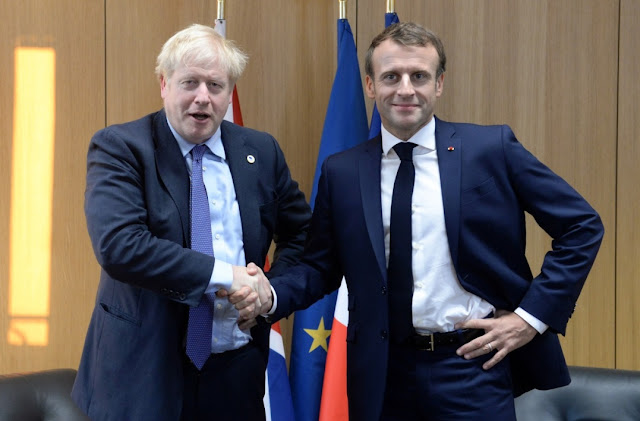China cautions U.S. that analysis over Uighurs not 'supportive' for exchange talks
Joined NATIONS (Reuters) - The United States and 22 different nations at the United Nations pushed China on Tuesday to quit keeping ethnic Uighurs and different Muslims, inciting China's U.N. emissary to caution it was not "useful" for exchange talks among Beijing and Washington.
China has been generally denounced for setting up edifices in remote Xinjiang that it depicts as "professional instructional hubs" to get rid of radicalism and give individuals new abilities. The United Nations says at any rate 1 million ethnic Uighurs and different Muslims have been confined.
"It's difficult to envision that from one perspective you are attempting to look to have an economic alliance, then again you are utilizing any issues, particularly human rights issues, to accuse the others," China's U.N. Minister Zhang Jun told journalists.
He said there was "progress" in the exchange talks. In any case, he said of the U.S. analysis of China at the United Nations: "I don't think its supportive for having a decent answer for the issue of exchange talks."
U.S. what's more, Chinese arbitrators are attempting to finish the content of an interval exchange understanding for U.S. President Donald Trump and Chinese President Xi Jinping to sign at an Asia-Pacific Economic Cooperation summit in Chile on Nov. 16-17.
A U.S. organization authority said on Tuesday it probably won't be finished in time for marking in Chile, however that doesn't mean the agreement is self-destructing.
When inquired as to whether the announcement censuring China could influence exchange talks, U.S. Envoy to the U.N. Kelly Craft stated: "I would remain here in any case in the event that it was China or any place it is, any place there are human rights manhandles we would be here with regards to those that are enduring."
England's U.N. Diplomat Karen Pierce conveyed a joint proclamation to the 193-part U.N. General Assembly's human rights advisory group for 23 states including the United States, Australia, Canada, France, Germany, Japan, The Netherlands, New Zealand, Norway and Sweden.
"We approach the Chinese government to maintain its national laws and global commitments and duties to regard human rights, including opportunity of religion or conviction, in Xinjiang and crosswise over China," Pierce said.
The gathering of states pushed China to critically actualize proposals by autonomous U.N. specialists on the circumstance in Xinjiang, "counting by forgoing the self-assertive confinement of Uighurs and individuals from other Muslim people group."
They additionally approached nations not to send displaced people or refuge searchers back in the event that they could confront oppression, Pierce said.
'Momentous ACHIEVEMENTS'
Zhang depicted the allegations against Beijing as outlandish and a "gross impedance in China's interior issues and purposeful incitement."
Independently, Belarus U.N. Diplomat Valentin Rybakov tended to the General Assembly rights board of trustees for the benefit of 54 nations, including China, Pakistan, Russia, Egypt, Bolivia, Democratic Republic of Congo, Serbia.
He applauded Beijing's admiration and assurance of rights while managing counterterrorism and deradicalization in Xinjiang and its promise to receptiveness and straightforwardness by welcoming ambassadors, writers and authorities to the locale.
"Presently wellbeing and security have come back to Xinjiang and key human privileges of individuals of every single ethnic gathering there are protected," Rybakov said. "We compliment China's wonderful accomplishments in the field of human rights."
The announcements pursue a comparative move at the U.N. Human Rights Council in July when 22 states - including the United States and Britain - composed a letter approaching China to end its mass detainments. Accordingly, Saudi Arabia, Russia and in excess of 30 different nations composed an adversary letter that recognized China's privileges record.
Asked by Reuters a month ago if U.S. analysis of China's strategies on Xinjiang and Hong Kong political fights could influence exchange talks, China's state councilor and remote priest, Wang Yi, stated: "We expectation exchange talks can have a free and great outside condition."
China disdains open analysis and met some outside emissaries before the most recent session of the U.N. General Assembly in New York, which started a month ago. Chinese human rights scholastics likewise guarded Beijing's approaches in Xinjiang, Tibet and Hong Kong during an instructions with columnists at China's U.N. strategic New York a week ago.
The United States drove in excess of 30 nations at an occasion uninvolved of the yearly U.N. get-together of world pioneers a month ago in denouncing what it called China's "horrendous crusade of restraint" against Muslims in Xinjiang. China censured the occasion.
Posted By TWIYH NEWS








Comments
Post a Comment